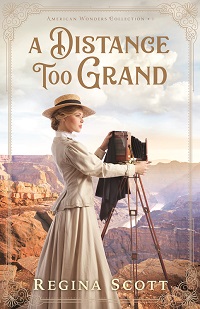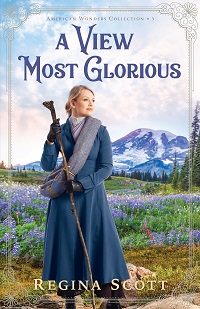
A Distance Too Grand
October 1, 2019 (ISBN 978-1-493-41955-5 ebook, 978-0-800-73639-2 paperback, 978-0-800-73715-3 hardcover, Revell)
Buy now from
Baker Publishing Group
Amazon (affiliate link)
Barnes & Noble
Kobo
Apple Books
Books-A-Million
Christian Book
A bookstore near you
The Book Depository, free shipping worldwide
Meg Pero has been assisting her photographer father since she was big enough to carry his equipment, so when he dies she is determined to take over his profession--starting with fulfilling the contract he signed to serve on an Army survey of the North Rim of the Grand Canyon in 1871. What she doesn't realize is that the leader of the expedition is none other than the man she once refused to marry.
Captain Ben Coleridge would like nothing more than to leave without the woman who broke his heart, but he refuses to wait even one more day to get started. This survey is a screen for another, more personal mission, one he cannot share with any member of his team.
As dangers arise from all sides, including within the survey party, Meg and Ben must work together to stay alive, fulfill their duties, and, just maybe, rekindle a love that neither had completely left behind.
Reviews and Endorsements
Top 10 Romances of the Year! Booklist named A Distance Too Grand among the top 10 romances of the year.
Lonestar Literary Bloggers Awards named the book best Christian fiction of the year for the books reviewed by those bloggers. They also awarded it the Perfect Five, meaning every blogger who reviewed it gave it 5 out of 5 stars.
 Starred Review! "Scott dazzles in the opening to her exciting new American Wonders Collection. Set in 1871 at Fort Wilverton, Arizona, A Distance Too Grand takes place in the Grand Canyon with sweeping vistas and picturesque scenes serving as the backdrop to a gripping plot." -- Kate Campos, Booklist
Starred Review! "Scott dazzles in the opening to her exciting new American Wonders Collection. Set in 1871 at Fort Wilverton, Arizona, A Distance Too Grand takes place in the Grand Canyon with sweeping vistas and picturesque scenes serving as the backdrop to a gripping plot." -- Kate Campos, Booklist
5 Stars! "This book was beautiful and not just because the cover is. I loved it so much! I was hooked from page one and I couldn't stop reading until I finished." -- Abigail Harder, Interviews and Reviews
5 Stars! "The character of Meg is a photographer, specializing in stereographs. Through her lens, the author shoots a vivid picture of the surroundings as she tells a tale that will keep you turning pages long after your bedtime. All the characters are well developed, but the main and secondary ones are extremely detailed. So much as that by the time the story was over, I felt that I knew them personally. The story caught my attention quickly, on the first page, and simply never let go. (Something I am learning to expect with this author.) Perfect for book clubs and highly recommended reading!" -- The Huntress Reviews
"Regina Scott knows how to write a fascinating adventure." -- Urban Lit Magazine Book Reviews
"Scott’s latest novel is a delightful, fun read and is recommended to anyone looking for a self-sufficient heroine, an utterly devoted hero, and one grand adventure." -- Historical Novel Society
 "A Distance Too Grand was a beautiful romance with the most amazing backdrop. I am always a sucker for a reunion romance, and adored watching Meg and Ben navigate not only the Grand Canyon, but the treacherous path to finally find love together. The Grand Canyon was the perfect setting for Regina Scott's introduction to her new American Wonders series. I look forward to visiting Yellowstone in the next book." -- Kathy Andrico, Kathy's Review Corner. Named one of the best books of 2019.
"A Distance Too Grand was a beautiful romance with the most amazing backdrop. I am always a sucker for a reunion romance, and adored watching Meg and Ben navigate not only the Grand Canyon, but the treacherous path to finally find love together. The Grand Canyon was the perfect setting for Regina Scott's introduction to her new American Wonders series. I look forward to visiting Yellowstone in the next book." -- Kathy Andrico, Kathy's Review Corner. Named one of the best books of 2019.
"Adventure, danger, and romance in a wonderful, fresh setting: the Grand Canyon of 1871. Readers will find much to love in A Distance Too Grand by Regina Scott." -- Julie Klassen, bestselling author
"Five star is not a rating I usually bestow. But Regina Scott's A Distance Too Grand merits it. Lively, realistic, engaging characters. A compelling and intriguing plot with life and death consequences kept me turning pages. I hated to put the book down. Ms. Scott's choice of setting is especially wonderful. This isn't your usual wagon train-type Western. The Grand Canyon exploration by the US Army gives a whole new view of the West and is depicted with great attention to accurate historical detail. If you enjoy a unique romance set in the historic West, this book is for you!" -- Lyn Cote, Carol Award-winning author
"I was needing a good book to read and found it with this one. A surveying expedition to the Grand Canyon provides the fascinating backdrop for this story. Regina has done an excellent job of bringing the setting and characters to life. I could see and feel the canyon and picture the characters going about their tasks. A balance of mystery, romance, and adventure with enough factual information that I almost felt I could take over for the heroine. I highly recommend this book." -- Linda Ford, award-winning, fan-favorite author of the Glory, Montana, series
"A Distance Too Grand by Regina Scott is a grand story indeed. Full of action, adventure, suspense, and danger, this story set in 1871 in Arizona Territory is about an expedition to explore, map, and photograph the Grand Canyon. Led by Corporal Ben Coleridge, the small crew sets out with a woman photographer. Meg Pero has to prove herself and assure Ben, a man who once asked her to marry him, that she is capable at what her father trained her to do. While searching for his missing father, dealing with rugged terrain, and studying flora and fauna, Ben tries to protect Meg from a menacing threat. But he remembers the woman he fell in love with at West Point. Meg remembers the man she left behind to pursue her first love-photography. Soon that love returns as golden and rich as the sun shining over the massive canyon. But Ben and Meg will have to find a way across their own eroded hearts in order to chart their journey together. A splendid telling of a part of the dramatic National Park history of America." -- Lenora Worth, author of Their Amish Reunion
A Distance Too Grand is available in e-book, trade paperback, audio, and hardcover formats.
Excerpt
Fort Wilverton, Arizona Territory, August 1871
“You can’t be the photographer.”
Meg Pero blew a stray blonde hair out of her vision, aimed her sunniest smile at the Army clerk, and laid a gloved hand on the contract sitting between them on the scarred wood counter. “This is a legally binding document, and that is a senior officer’s signature, is it not?”
The clerk squinted down at the scrawl. “Yes, ma’am. But I was told the contract was with Matthew Pero. You’re not Matthew Pero.”
Indeed she wasn’t. She’d worked most of her life to be as good a photographer as her father. Few knew that she had taken many of the pictures attributed to him the last three years.
“If you look closely,” Meg said, bending over the contract, the sunlight from the door behind blazing across the crowded quartermaster’s office, “you’ll see the name is M. Pero. M for Margaret.”
Corporal Dent bent lower as well, dark wool cap slipping on his short brown hair, then raised his eyes to meet her gaze. “But you can’t be the photographer.”
She sighed despite herself. She’d been expecting the argument ever since she’d discovered the contract among her father’s effects. He had to have negotiated it more than five months ago, before he’d fallen ill. Papa had always been the one to negotiate their services.
“Men don’t like haggling with women, Meg,” he’d explained more than once. “Just smile and look pretty, then show them you can do the job better than any of them.”
She’d never liked that advice, but she certainly couldn’t follow it now if the clerk wouldn’t even give her a chance!
It had been like that most of her trip—arguments, protests. Women couldn’t be seen here, sit alone there. She was too short and slight to look imposing, more likely to smile than scowl. Normally men hurried to help when she glanced their way. But sweet words of persuasion and eager looks had not availed her much this time.
Things had been so much easier when Papa was alive. He could charm his way into any situation, make her presence seem perfectly reasonable. He’d probably have found a way to explain why she’d come riding up with the supply train to the dry red-rock plateau that held the adobe buildings of the fort, pulling ten mules loaded with photographic equipment that the clerk of the fort was attempting to turn away.
“It’s a perfectly good contract,” she said. “There were probably lawyers involved.”
He scratched at his navy wool jacket, and she envied him the uniform’s warmth. Though the last few days of travel from Utah had seen warm temperatures, the nights were cool. As it was, she wore her navy wool cloak over her sky-blue cotton blouse and tan twill skirt.
“I don’t doubt it’s legal, ma’am,” he said. “I also don’t doubt Captain Coleridge would put me in irons if I added you to the payroll.”
Captain Coleridge? Funny. She was certain Fort Wilverton’s commanding officer, who had signed the contract, had been a Colonel Coleridge. Not that she had any interest in making his acquaintance. That was one of the reasons she’d headed straight for the quartermaster’s office instead of fort headquarters. Someone would eventually inform the colonel of her presence, but perhaps she would be able to make her escape with the survey team without meeting him again. How could she reintroduce herself to the famous Army colonel when she’d broken his son’s heart five years ago?
“Captain Coleridge,” she said, “will be as bound by that contract as you are.”
He pushed the paper at her as if afraid it might bite. “But you’re a woman. Women aren’t photographers.”
Meg kept her smile in place. “On the contrary. There are ladies right now who run photography studios in England, Germany, and New York.”
“All well and good, ma’am,” he said. “But we can’t have women on a survey expedition.”
Now, that point she’d come prepared to argue. “Your commanding officer told my father in a letter that the cartographer’s wife will be joining the survey.”
“Yes, but Mrs. Newcomb can cook,” he protested, backing up until his shoulders bumped the rough-wood shelves behind him, setting the canteens stocked there to rattling.
“And I can take pictures,” Meg informed him. “I see no difference.”
“You would if you knew Mrs. Newcomb,” he muttered.
Meg refused to dignify the comment with a response. She’d traveled more than two thousand miles—-by rail, wagon, and finally mule—-to reach the fort. Corporal Dent couldn’t know the danger she’d left behind, a threat to everything she’d ever known. She could still see the glitter in her aunt’s green eyes as the family had returned from Papa’s funeral.
“You’ve been terribly cozened, Margaret,” she’d said, leading Meg into her dingy little house in Norfolk. “As far as I can see, your father filled your head with nonsense about your place in this world. At six and twenty, a young lady should be wed, with children playing at her feet.”
“But that would make it terribly hard to get the shot,” Meg had replied.
Aunt Abigail had not been amused. But then, Meg had learned, Aunt Abigail was never amused.
Truly, had there ever been two more different siblings? Her father had been joyful, carefree, expansive in gesture, vocabulary, and choice of living. His widowed younger sister seemed grim, weighed down, and tight-laced in body and spirit. Her son, Meg’s cousin, had been equally as restricted.
“You can have no further use for that camera equipment,” Cousin Harold had maintained, standing with his arms crossed over his broad chest in the door of the prison cell of a room they’d given her. “By rights, it should be mine. I’m sure I could get a pretty penny for it.”
Over her dead body.
Neither of them understood. She loved the trade she’d been baptized into, the way the world opened through the lens of her camera. It was a challenge and an art to choose the exact right angle, the exact right light, to create something extraordinary out of the ordinary, to share a glimpse of the divine. How could they ask her—no, order her—to give it up, as if it were something shameful?
Papa had refused to allow her gender to get in the way of their trade. He’d taken her with him to the edge of the battlefield and the wilds of the frontier. She’d met women who nursed wounded soldiers, taught natives to read and write, forged a home in untamed territory. She knew her life didn’t have to be confined to the sitting room and the kitchen.
Aunt Abigail and her son had other ideas. They seemed to view her gender as a limitation, and one that must never be overcome. She’d only met one other woman with such rigid ideals. A shame she’d been the mother of the man Meg had thought she might love.
She’d tried to play the demure miss for a time when her father had had a studio. She’d taken tea in the afternoon, attended balls and soirees. She’d never fit in. Indeed, she sometimes wondered whether she was constitutionally capable of it. Her ideas, her hopes, her skills were as expansive as her father’s. She’d escaped her aunt’s narrow expectations by working with a friend of her father’s to sneak her equipment out of the house and used the money Papa had left her to purchase the transportation she’d need to head West. She’d escape this clerk’s expectations as well. Too much depended on it—her freedom, her future.
“Perhaps you should speak with Captain Coleridge,” she said, straightening. “He signed the contract. Only he can renegotiate it.”
“Colonel Coleridge signed that,” the clerk said. “He went missing two months ago. Our interim officer in charge of the fort, Colonel Yearling, will back me up. He likes regulations.”
Meg frowned. “So is Mr. Coleridge a colonel or a captain?”
“Both,” said a familiar voice behind her.
Summer turned to winter. She must have been staring at the clerk, for he was reddening. She rather thought she was white.
God, if you’re still there, if you still care, not him. Not now.
“Is there a problem, Corporal?” the man behind her asked.
Oh, but she couldn’t mistake that voice, even ringing with command. It seemed God wasn’t going to answer this prayer either, just as he hadn’t seen fit to allow her father to survive his illness.
Corporal Dent squared his shoulders. “No, sir. This citizen says she’s to go on the survey expedition to the North Rim, but it’s clearly a mistake. I can deal with the likes of her.”
Meg bristled, but the voice behind her was now all commiseration.
“No need to be rude, Corporal. I’d be happy to explain the situation to the lady. If you’d tell me your name, miss?”
So well meaning. That was one of the traits that had originally drawn her to him. That and his unrelenting confidence. Easy to turn now, to greet her long-lost love, to let him convince her she should go back home.
But there was no home and never would be if she didn’t win this commission.
She raised her chin and turned. Even though she knew who she would find behind her, the sight of Benjamin Coleridge still shook her. That shock of golden-brown hair, so thick and silky; those blue-gray eyes that could look deep inside her. The chiseled chin that could soften with emotion, that strong physique outlined in the navy wool of his uniform jacket, two silver bars on his shoulders. Oh, but she could hear the ladies sighing from here.
Once more she put on her best smile. “Good afternoon, Captain Coleridge. I must insist that I join your expedition. I’m your photographer.”
Ben Coleridge stopped, hand extended in greeting. He’d assumed he’d been about to meet someone’s sweetheart or sister. But Meg Pero? Here? How? Had the Arizona sun addled his wits?
Just looking at her took him back to West Point, the walks among the trees, the stolen moments at balls. She was as beautiful as he remembered, pale blonde hair wound up under a surprisingly practical broad-brimmed straw hat, figure swathed in a dark wool cloak. The fire in those green eyes dared him to argue with her. He never had been able to argue, even to beg her to stay.
He inclined his head as he pulled back his hand. “Miss Pero. I take it you’re here with your father.”
he raised her chin a little higher, all bravado, though her cheeks held little color. He remembered them pink with delight, soft to his touch.
“My father passed away,” she said.
Sorrow washed over him. Matthew Pero had been a friendly fellow, always ready to talk, to laugh. His daughter had been much like him. The two had been nearly inseparable, unlike him and his father.
“My condolences,” he said. “Your father was a good man, and a great photographer.”
That determined chin inched higher. “Which is why I intend to carry on his work.”
Corporal Dent’s sigh was audible. “You see, Captain? She won’t listen.”
She never had. Meg Pero did what she liked and never mind the consequences. He’d had to accept her decision once. Not this time.
“Corporal Dent is correct,” he told her. “You cannot serve as an expedition photographer.”
Once more her green eyes flashed, and she gathered her skirts and swept up to him. He’d faced hailstorms that had threatened to flatten him, rising rivers set to sweep him away, and Apaches out for his blood, but this was the first time he’d considered retreating.
“I have worked as a photographer for eighteen years,” she said, head tilting back to meet his gaze, “ever since my father started having me position the equipment at age eight. Though my father was given credit for much of it to assuage the sensibilities of editors, my work has appeared in the Atlantic, the New York Times, and the Boston Evening Traveller. I have shot portraits, still lifes, campaigns, and the greatest works of nature. In short, Captain, I have more experience than most photographers the Army hires, and I have a contract.”
Corporal Dent helpfully lifted the piece of paper and held it high. She was all fire, all ice, every inch of her bristling. He couldn’t agree.
“I don’t care if you have an invitation from the president,” Ben told her. “I’m not bringing you on this expedition. Take pictures of the fort if you must. Corporal Dent will schedule you on the next pack train north. Good-bye, Miss Pero.”
He turned on his heel, but he heard the scuffle of her boots as she followed him out the door.
“Wait! You need me!”
Once he had thought so. He had been certain she was the only one for him. Her response to his proposal had proved him wrong.
Now he turned to eye her as she came out of the quartermaster’s office. Her cloak belled around her like wings, betraying a figure as slender and elegant as he remembered. Something nudged at him, told him to apologize. Not now. Not again. He widened his stance, gave her the glare that made the men under his command rush about their duties. “The answer is no, Miss Pero.”
She drew up beside him, hands fisted in her skirts. “Even though you’re already late in the season? You won’t get another photographer here for months.”
She was right. He’d heard that Timothy O’Sullivan was engaged with Wheeler, William Bell at Kanab. There were only so many photographers skilled enough to take their equipment into the wilderness and capture the grandeur of new territory. The Army had been making use of them since the War Between the States. Many had forged a reputation for themselves and no small income selling prints and stereographs from their work. He’d known starting out that a photographer would be key to this expedition.
“Don’t worry,” his commanding officer had said, clapping him on the back as Ben took his leave to head for Fort Wilverton.
“I hear the Army hired Matthew Pero. He’s the best. He’s been alerted to the delay but should arrive shortly after you do.”
Ben could only be thankful. Matthew Pero had photographed many a landmark across the country, Meg at his side. Their stereographic views were famous, enjoyed by thousands. He had no doubt she knew her way around a camera. But she couldn’t appreciate the dangers she’d be facing. His mother and sister had hesitated to join his father when he’d been made commander of the fort. Arizona had been its own territory for less than a decade and was known more for its vast vistas and copper than any sort of society. Likely his mother and Diana would never come now that the Colonel had disappeared.
And would he have any chance to discover why his father had gone missing if he delayed much longer?
Something of what he was feeling must have shown on his face, for she took a step closer and laid her hand on his arm. “Please, Ben. I need the work. I won’t let you down. Take me with you.”
How could he? He could think of a dozen ways she might be harmed by nature alone. The wildly fluctuating temperatures, scant water, predators like mountain lion, vermin like rattlesnake. Flash floods, wildfire, lightning storms. The glory of God’s creation was nearly as commanding as his father.
And he couldn’t tell her the other dangers he feared.
Yet it was already August. They had at best two months, barely enough time for the survey, before snow began to fall along the North Rim. The Grand Canyon, they called it, and everything he’d read said searching for a way to ford it by wagon would be a great adventure, the kind he’d always imagined. That was why he’d abandoned his father’s dreams for him and become an engineer instead of a cavalryman—to explore new lands, chart new territory.
Besides, the Army Corps of Engineers had invested considerable funds equipping a survey team and a photographer, the effort planned months ago and plagued by delays. The work was to augment the efforts of the Wheeler Survey of 1869 to find a wagon road across the West. But Wheeler had his eye on bigger game. He was proposing to document and map the land south of the one hundredth meridian, with the hope to identify locations for Army outposts and opening the area to settlers. Ben heartily agreed with the approach. He’d served on the 1869 survey and knew the potential.
Finding a way to cross the Grand Canyon was critical. Troops, settlers, and the sutlers to supply them had to make long detours east or west to avoid it. Congress wanted to change that. Already John Wesley Powell was making a second attempt to navigate the Colorado River down the canyon with a government-backed team of ten handpicked men and specially built boats. If Ben didn’t leave within the week, he’d have to wait until next May.
And he’d lose all opportunity to learn what had happened to his father.
“Do you have any idea how dangerous this could be?” he demanded.
She squeezed his arm. “Yes. My father always said nature would kill him if man didn’t do it first. I’m not afraid, Ben. This is a grand adventure. Think of the vistas we could capture.”
Think how easily she could recapture your heart.
He shoved the thought away. He was immune to Meg Pero’s charm. Her sweet smile, the touch of her hand, wasn’t why he was about to agree with her outrageous request. He couldn’t leave without a photographer, and she was the only one available.
“Very well,” he said and was rewarded with a barely suppressed squeal of joy. “Join me at the enlisted mess at five, and you can meet the rest of the team.”
Buy Now
Baker Publishing Group
Amazon (affiliate link)
Barnes & Noble
Kobo
Apple Books
Books-A-Million
Christian Book
A bookstore near you
The Book Depository, free shipping worldwide
Extras
Meg Pero specializes in stereographs, side-by-side pictures that gave a 3D effect when viewed through a stereoscope. Learn more about them in this article.
And look for the other books in the American Wonders Collection


